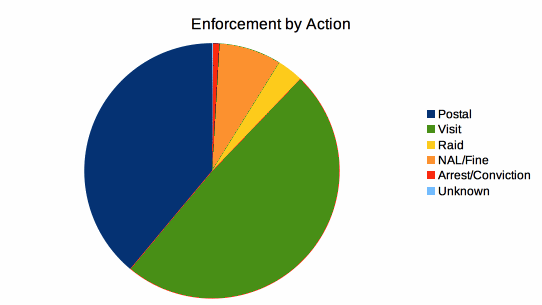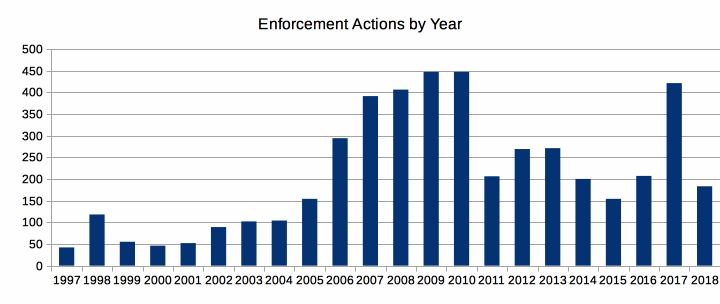While I may still be on partial hiatus, as the fall semester ends in its typical whirlwind of student-meetings, evaluations, and grading, life moves on. And I am pleased to report that the microradio movement is alive and well. I will be most interested to see just how the FCC wraps up this year’s “war on pirates” – when I finally find the time to digest the data.
Some heartening news comes from the old guard in California. Berkeley Liberation Radio, after suffering a government raid on its studio premises (not related to the station itself), has safely relocated and is kicking as usual. Across the Bay, San Francisco Liberation Radio has also been revived – the correspondence I received does not explicitly state that this return will include a frequency-modulated signal, but it leaves room for speculation: “Since our court case was resolutely rejected by the Ninth Circuit, SFLR dropped the legal proceedings but continued to stream internet radio. Now [a new crew] will continue in the long and storied tradition of SFLR in the South of Market area.” You can’t keep a good idea down. Continue reading “Scene Report: California”
Category: Pirate Radio
Re-Translating the U.S. Elections Through U.S. Propaganda
Paul the Mediageek recently did an excellent interview with Sarah Kanouse, Assistant Professor in the Intermedia Program at the University of Iowa’s School of Art and Art History, about her latest project, Voices of America. In short, this VOA is a re-interpretation of presidential election coverage provided by the real Voice of America – the main radio arm of the United States’ international, over-the-counter propaganda efforts. Continue reading “Re-Translating the U.S. Elections Through U.S. Propaganda”
Berkeley Liberation Radio Collateral Damage in FBI Raid
An FBI raid last week on the Long Haul Infoshop in Berkeley has taken Berkeley Liberation Radio off the air, hopefully temporarily. Details are sketchy as to why the FBI raided the space in the first place, but guns-drawn agents were not picky about what they hauled away. Continue reading “Berkeley Liberation Radio Collateral Damage in FBI Raid”
Post-Facto Piracy: Not So Bad
I just updated the Enforcement Action Database: FCC field agents really went on a tear in July, and they are on pace to meet or beat their enforcement record set just last year.
But the really interesting cases I found involved stations who were licensed, let them lapse, and then just kept running as if nothing was amiss. Continue reading “Post-Facto Piracy: Not So Bad”
FCC Agents Illegally Impersonate Real Cops
This is a first, as far as I know. The FCC’s tried to bluff their way into busts in the past, but not past actual cops.
In June, FCC Enforcement Bureau field agents made a run into Mount Carmel, Tennessee, to investigate unauthorized jamming of a police radio channel in the area (the problem had been going on for months before the FCC got around to sniffing around).
While in town, the agents ran into Mount Carmel and Church Hill police officers not once, but twice, on traffic stops. In both instances, the FCC folks told the local cops that they were part of the Tennessee Bureau of Investigation Meth Task Force. They had no credentials to back up their claim, and that made the cops suspicious. Continue reading “FCC Agents Illegally Impersonate Real Cops”
XM/Sirius Merger Hinged on Piracy Compliance
After a week-long, non-transparent deliberation, the Federal Communications Commission has reportedly signed off on the merger of the XM and Sirius satellite radio networks.
Many of the tea leaf-readers did not correctly forecast the outcome: most expected at least one Democratic Commissioner, Jonathan Adelstein, would vote for the merger, provided there were certain public interest obligations on the new, singular satellite broadcast entity. These would have included requirements such as a percentage of total satellite radio capacity be devoted to non-commercial, possibly public-access channels, and that the new company provide tiers of service that do not gouge existing and future subscribers. Some of these conditions will apply to the merged company, but the Commissioners’ votes themselves ultimately split along party lines. Continue reading “XM/Sirius Merger Hinged on Piracy Compliance”
FCC Enforcement Focus Diversifying?
When it comes to unlicensed broadcasting, I only monitor the FCC’s activity against pirate AM, FM and shortwave stations. And as far as those areas are concerned, the FCC is on relative track to meet its record-breaking enforcement effort of last year.
 However, the devil is in the details. As you can see from the breakdown of enforcement activity at right, nearly 80% of all FCC enforcement actions fall into the categories of station-visits and warning letters. Continue reading “FCC Enforcement Focus Diversifying?”
However, the devil is in the details. As you can see from the breakdown of enforcement activity at right, nearly 80% of all FCC enforcement actions fall into the categories of station-visits and warning letters. Continue reading “FCC Enforcement Focus Diversifying?”
Microradio: As Pawn and Pain In the Ass
It’s hard to imagine that the FCC in 2007 would end the year with such a thud, but it has. With the promulgation of a rule effectively repealing the ban on newspaper/broadcast station cross-ownership – drafted in the dead of night, formally introduced in a newspaper op-ed, modified without consensus, and approved along partisan lines, with outright disdain for the 99.99% margin of public disapproval of both the practice and policy – Kevin Martin’s FCC has firmly put itself in the political cross-hairs.
A lawsuit to challenge the ruling is in the works, and members of Congress are yelping as their constituents call all pissed off (and rightly so); they’re pondering taking actions ranging from a “resolution of disapproval” of the FCC’s cross-ownership action, to a bill formally repealing the FCC’s decision, to a campaign to scrutinize and overhaul the FCC itself next year. The latter option would definitely be the most interesting to observe – anytime an agency goes into the legislative woodshed for restructuring, it’s going to disrupt business as usual. Regardless, this issue is far from finished, and still has the potential to undertake several dangerous iterations. Continue reading “Microradio: As Pawn and Pain In the Ass”
FCC On Track to Meet/Beat Enforcement Record
As the graph to the right shows, the agency’s Enforcement Bureau is well on pace to meet or exceed last year’s record-breaking enforcement action effort.
 Looking more closely at the data, one can see how FCC field agents are escalating the initial levels of the enforcement protocol much more quickly now (for example, the New York field office has cut the time between visit to warning letter down to as little as eight days). Continue reading “FCC On Track to Meet/Beat Enforcement Record”
Looking more closely at the data, one can see how FCC field agents are escalating the initial levels of the enforcement protocol much more quickly now (for example, the New York field office has cut the time between visit to warning letter down to as little as eight days). Continue reading “FCC On Track to Meet/Beat Enforcement Record”
Attorney General Nominee No Friend of Pirates
Recently, former federal judge Michael Mukasey was nominated to be the next Attorney General of the United States. There’s lots of punditry going on within the mainstream media about his past legal leanings (surprise, they’re reactionary!), but Mukasey’s also been involved in microradio case law to a degree not experienced by any other contemporary Attorney General. It was back in 1998, when the Steal This Radio collective preemptively sued the Federal Communications Commission in hopes of stopping a station raid or other major, life-threatening enforcement action.
STR’s lawsuit was not the most well-thought-out piece of legal argument. It took a shotgun approach to the FCC’s licensing authority: some claims alleged the Communications Act itself was unconstitutional because it gave the FCC excessive latitude to restrict access to the airwaves via the licensing mechanism; one claim specifically attacked the practice of auctioning off commercial radio licenses for limiting “free expression” only to those who can afford it. Another posited the radio spectrum as a public forum, which necessitated the strictest scrutiny of government attempts to regulate it; under such analysis, the broadcast licensing regime was overly restrictive and therefore also unconstitutional. Continue reading “Attorney General Nominee No Friend of Pirates”